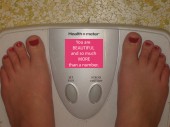NEDA Week 2011: What Have We Learned?
National Eating Disorders Awareness Week 2011 ends Saturday, Feb. 26. Each year as it draws to a close, I always think about what I and others have gained from the presentations, articles, and other activities devoted to helping people understand eating disorders.
The prevailing message each year is one of hope and belief that eating disorders do not have to rule anyone's life. I gave two presentations this year about eating disorders. I spoke Tuesday night to a group of young college students at the university where I attend graduate school. I talked about the dangers of eating disorders and encouraged each one of them to accept their bodies as beautiful and unique. I briefly told them my story of how I developed anorexia in my early forties and that this was not a path that they wanted to take. I stressed the importance of talking with a counselor or someone at the university's health center if there was even an inkling of a problem. I looked around the room filled with thirty or so young people and guessed at least several most likely had some type of eating disorder.
I gave two presentations this year about eating disorders. I spoke Tuesday night to a group of young college students at the university where I attend graduate school. I talked about the dangers of eating disorders and encouraged each one of them to accept their bodies as beautiful and unique. I briefly told them my story of how I developed anorexia in my early forties and that this was not a path that they wanted to take. I stressed the importance of talking with a counselor or someone at the university's health center if there was even an inkling of a problem. I looked around the room filled with thirty or so young people and guessed at least several most likely had some type of eating disorder.
That is how prevalent eating disorders are: 10 million females and 1 million males have an eating disorder. Eating disorders strike people of all races and ages, and the number of males with eating disorders is most likely undercounted because of the stigma surrounding being a male and having an eating disorder. There are numerous more people who suffer from binge eating disorder.
The second presentation I gave was at an area hospital. It was somewhat poignant for me to be returning to this hospital, because I was a patient connected to a feeding tube on the ninth floor of this hospital this time last year.
I also was sad as I prepared this presentation because it was much more personal. I reviewed old blog posts and journal entries and was sadden by the person I had been: someone who decided she wasn't worth recovery and therefore was just going to live out her life as an anorexic.
I talked about all this during the hospital presentation, and my involvement with pro-anorexia websites that held me captive for much of 2010. I was able to end on a happy note. I never dreamed I would be at my healthy goal weight by the next year, on the road to recovery and re-establishing my relationship with my husband, family, and friends.
I saw a frail young woman at the hospital presentation. She reminded me of myself last year, lost and lonely and depressed. I impulsively ran after her and told her it would be okay, that she could recover and live a full life. I'm not sure how far my words reached her. I just hope my hug helped her at least a bit, and that she knew I cared that she got better.
So what have we learned? I think many people learned that eating disorders are real illnesses, and that it is not someone's fault if he or she develops an eating disorder. I learned to feel compassionate toward those who haven't been able to find the key to recovery.
Finally, I think many of us learned we can recover from eating disorders. I think we learned that we can hope and dream for a better future, one of joy and freedom.
I was given a small wall hanging after my first presentation. It says, "Every journey begins with a single step." That is recovery. I had to take the first and most difficult step and eat. Each day it is easier to take these steps. Soon it will just feel normal, and then I will be completely free.
APA Reference
Gambrel, A.
(2011, February 25). NEDA Week 2011: What Have We Learned?, HealthyPlace. Retrieved
on 2025, December 27 from https://www.healthyplace.com/blogs/survivinged/2011/02/neda-week-2011-what-have-we-learned
Author: Angela E. Gambrel
Anorexia nervosa as eating disorders presents a cognitive deviatioon about body appearance. The illness individuals have a fix idea that they are obese, even the may be thin. The statistical evidence worldwide has proven that female are most prone to develop this life-threatening psycho-somatic disorder. In clinical psychiatry we distinguished two kinds of anorexia: restrictive and excessive ones. The process of recovery from these morbid entities in parallelof medical intensive treatment requires a proffessional psycho-social intervention such are many cognitive behav ioral approach. In order to healing this dangerous eating disorder wellcomed are the experiences of ex-anorectic patient, as You Mrs Lackey used to practise in your benevolence activity. Congratulation!